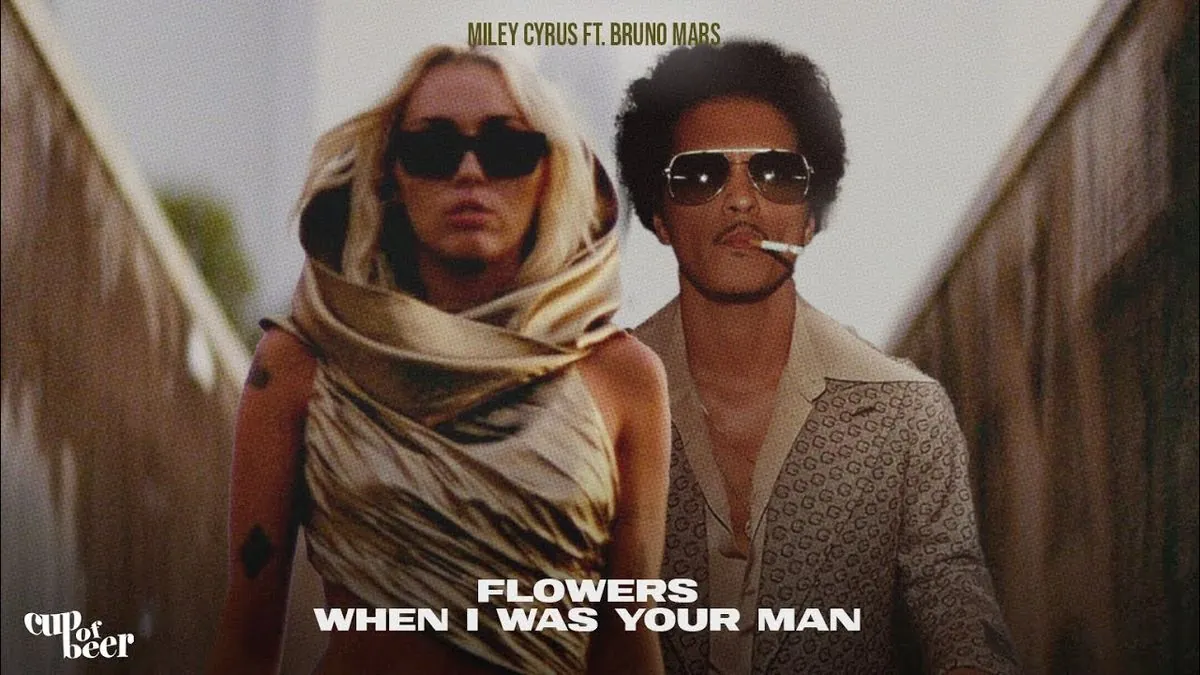Miley Cyrus Faces Copyright Lawsuit Over Hit Song "Flowers"
Tempo Music Investments alleges Miley Cyrus' "Flowers" infringes on Bruno Mars' "When I Was Your Man" copyright. The lawsuit cites melodic and lyrical similarities, involving streaming services and retailers.

In a recent development in the music industry, Miley Cyrus finds herself at the center of a copyright controversy. Tempo Music Investments has filed a lawsuit against the pop star, alleging that her chart-topping single "Flowers" infringes on the copyright of Bruno Mars' 2013 hit "When I Was Your Man."
The legal action, initiated on September 16, 2024, in a California federal court, claims that Cyrus' song duplicates "numerous melodic, harmonic and lyrical elements" from Mars' composition. Tempo Music Investments, which acquired a share of "When I Was Your Man" from co-writer Philip Lawrence in 2020, is seeking unspecified monetary damages and an injunction to halt the alleged infringement.
The lawsuit extends beyond Miley Cyrus herself, implicating streaming service providers such as Apple and Amazon, as well as major retailers like Target and Walmart, for their role in distributing the allegedly infringing song. This broad approach highlights the complex nature of music distribution in the digital age and the potential liability faced by various entities in the supply chain.

"Flowers," released in 2023 as part of Cyrus' album "Endless Summer Vacation," has achieved remarkable success. The song has amassed over 1 billion streams on Spotify and clinched the Grammy award for Song of the Year in 2024, underscoring its significant impact on the music landscape.
The legal complaint cites "striking similarities" between the two songs, including melodies, bass lines, chord progressions, and lyrical elements. To bolster its case, Tempo's lawsuit references a 2023 Billboard article that noted, "any listener can detect that [Mars' song] boasts a chorus that is the inverse of what Cyrus sings on 'Flowers.'"
This case brings to light the ongoing debates surrounding musical plagiarism and copyright infringement in the industry. The concept of musical plagiarism has been a contentious issue for decades, with numerous high-profile cases shaping the legal landscape of intellectual property in music.
As the legal proceedings unfold, the music industry watches closely. The outcome of this case could have significant implications for artists, songwriters, and music rights holders, potentially influencing future creative processes and copyright considerations in the ever-evolving world of popular music.
"Flowers" duplicates "numerous melodic, harmonic and lyrical elements" of Mars' song, which topped the Billboard Hot 100 in 2013.
At the time of reporting, representatives for Cyrus' label Sony Music, Tempo Music Investments, and the implicated streaming services and retailers had not responded to requests for comment. Bruno Mars, whose song is at the center of the controversy, is not a party to the lawsuit, and his label, Atlantic Records, has declined to comment on the matter.
As this legal battle unfolds, it serves as a reminder of the intricate relationship between creativity, inspiration, and copyright in the music industry. The case may prompt discussions about the fine line between homage and infringement, potentially influencing how artists approach songwriting and production in the future.


































